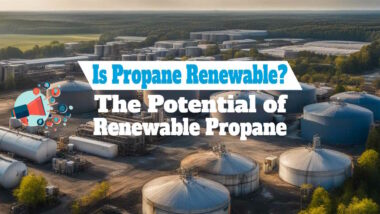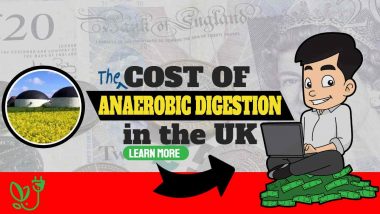In 2021, AD in the UK saw yet another year marked by missed opportunities, as the government's pledges to support and promote these sustainable technologies remained unfulfilled.
Amidst promises of commitment to achieving net-zero emissions by 2050 at COP26 in Glasgow, AD in the UK was left to face a multitude of challenges without government help of the sort available in the EU, making it a year of stagnation for the sector.
Unkept Promises for AD in the UK by 2023
Renewed Commitment to Net Zero was Lacking
In the lead-up to COP26, the UK government vowed to demonstrate its dedication to achieving net-zero emissions by 2050, but concrete actions for AD in the UK were conspicuously absent from their plans.
Despite the sector's potential to significantly reduce greenhouse gas emissions through the conversion of organic waste into renewable energy, it remained marginalized.
Funding Promises Have Been Broken
AD in the UK was promised additional funding support, particularly for projects involving organic waste and agricultural residues.
However, the funding that materialized fell far short of what was necessary to propel the sector forward. This shortfall left many AD in the UK projects in limbo, unable to secure the financial support required to initiate operations.
What Happened to the Streamlined Regulations Promised by Brexiteers?
Streamlining regulations for AD in the UK was a central commitment by the government.
However, bureaucratic hurdles and a lack of clear guidance continued to impede the UK AD sector's development, making it challenging for potential investors and project developers to navigate the complex regulatory landscape.
Promotion of the Circular Economy Faltered
While the circular economy's promotion was central to sustainability efforts, AD in the UK's role in closing the loop by converting organic waste into valuable resources remained largely theoretical. Real changes in waste management practices were limited, despite the government's commitments.
Community Engagement: The government pledged to engage local communities in AD in the UK projects to ensure that the benefits were shared with the nearby population. However, many communities continued to express concerns about the potential environmental and social impacts of these projects, signaling a lack of meaningful engagement and communication from the government.
AD in the UK: 2023 – A Conclusion
Despite the government's professed commitments and promises to support AD in the UK as an integral part of the nation's green energy transition, 2021 proved to be another year of stagnation for the industry.
Unfulfilled promises, funding shortfalls, regulatory challenges, and limited progress in promoting a circular economy all contributed to the sector's stagnation.
As we move forward into 2024, it is crucial for the government to reassess its approach and take concrete actions to unlock the full potential of AD in the UK in achieving the nation's net-zero emissions goal.
Only through genuine commitment and effective support can the country make significant strides towards realizing this vision.
2020, 2021, 2022 – The Lost Years for UK AD Plant Development
This article is an update on our original article which was updated in October 2023. It still remains relevant and very little has changed since it was published. See our archived version below:
Archive article:
2020 A Lost Year for New Anaerobic Digestion in the UK
2020 has been a lost year for new anaerobic digestion plant capacity in the UK.
A few years ago there were UK biogas plants starting construction at the rate of at least two a month, and the industry was even then disappointed and thought the rate should be higher. It was hoped that at least in 2020 with the UK's Brexit departure set in stone at year's end, the UK industry might return (later in the year) to the rate of progress seen pre-2016.
It was in 2016 that the withdrawal of most UK government support for the technology began to stall new project starts which had been running at double that rate or higher for several years. Many will blame the COVID-19 pandemic for the poor performance this year, but in other industries such as in the UK wind-powered energy sector, turbine construction activity has continued.
In the last 2 to 3 years the UK government has made increasingly encouraging announcements about supporting the production of renewable energy production in areas of high potential such as the AD industry. But action seems to have been almost entirely lacking.
It seems that while Brexit talks continue to occupy the cabinet, much more important UK decisions will continue un-resolved, let alone will any real progress be made:
- on climate change pledges, and
- the benefits offered by a vibrant biogas industry.
- The industry can also, let's not forget, generate many jobs at a time when these are so badly needed. At least 20 UK AD plants must be sitting with planning permission granted, and can surely be “shovel ready” in no time if only decisions are made to return confidence to the UK AD sector.
But, we are not about to let other European governments off the hook here. Their renewable energy performance when judged against the promises made during the Paris Accord 2015, and general statements made subsequently toward Net-Zero 2050 goals is also very disappointing.
Crop Based Biofuels
What are Crop-Based Biofuels?
Crop Based Biofuels are first-generation biofuels.
These are fuels made from food crops grown on arable land. The crop's sugar, starch, or oil content is converted into biodiesel or ethanol, using transesterification, or yeast fermentation.
via Wikipedia
Crop-based biofuels are often described as first-generation biofuels.
Disadvantages of Crop-Based Biofuels 2020 to 2023
It is clear that a significant reduction in vehicle fuel emissions has been, and still is, gained from crop-based biofuels through processes other than anaerobic digestion. This is a form of fuel production that although renewable by its general nature has been heavily criticized as a high methane emission technology and before the Ukraine war was being limited globally due to the fact that:
- while it is undoubtedly a lower carbon-emitting energy source than fossil fuel sources, including natural gas, it isn't particularly low carbon-emitting
- government subsidies for crop-based biofuels have been heavily criticized for their suspected perverse effect in raising food prices. In principle, how can it make sense for governments which say they intend to keep food prices low, to continue to subsidize farmers to take a food crop (often maize -sweetcorn) off the food market to use it to make fuel?
The UK biogas industry, in particular, which produces a low output of crop-based biofuels which in recent years is considered to amount to no more than a 1% use of the national maize crop is tired of being roundly criticized for the use of food crops in this way.
Crop-Based Biofuels Worldwide
However, many countries have allowed higher crop-based biofuel production and subsidies since the start of the illegal Russian occupation.
While some older AD plants on farms in the UK continue to use a large proportion of food crops in their biogas plant/ digester feed mix, those that do are generally operations set up many years ago. They continue to be grandfathered in upon funding agreements under the UK government's ROCS scheme which is due to end in the next few years. Those AD plants are a small and diminishing part of the UK industry.
Crop-Based Biofuels in the UK
For many years the UK AD industry has been an industry based upon the use of AD technology to process all forms of waste biomass, and when maize is used as a feedstock it is used in such a way that the waste (stalks, leaves, etc.) form the feed for the biogas process.
Let's be clear, the global biogas industry projections by bodies such as ADBA and the WBA for the contribution of up to 11% contribution (which we have reported previously here) that biogas can make to reducing carbon emissions from transport before 2050, are based upon biodegradable waste biomass feedstocks, and not food crops with only a few exceptions.
To explain this more fully, the energy industry distinguishes between the many sources of biofuel through the concept of “generations of biofuels”. Read on to find out more:
Second-Generation Biofuels Destined for Use in Producing Biogas and by Upgrading to Become Biomethane?
Those fuels will be second-generation biofuels using current and future anaerobic digestion process technologies.
Wikipedia defines second-generation biofuels as:
Second-generation biofuels are fuels made from lignocellulosic or woody biomass, or agricultural residues/waste. The feedstock used to make the fuels either grow on arable land but are byproducts of the main crop, or they are grown on marginal land. Second-generation feedstocks include straw, bagasse, perennial grasses, jatropha, waste vegetable oil, municipal solid waste and so forth.
There are also third and fourth-generation biofuels the technologies for which are not so far advanced in their development.
Conclusion
We hope that the sections following the [RE]fuel article above explain fully the fact that most of the reduction so far in carbon emissions by European nations has not been from anaerobic digestion and the use of upgraded biogas production (biomethane).
It is hoped that government actions throughout the globe will soon begin to remedy this by encouraging investment in their anaerobic digestion industries.
[First published on 6 December 2020.]






